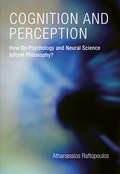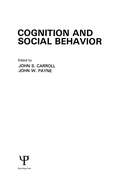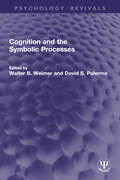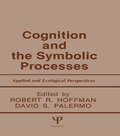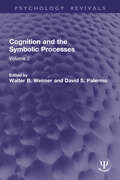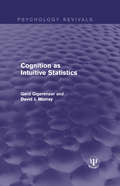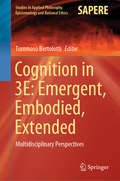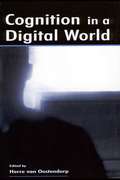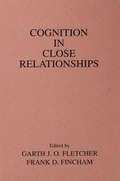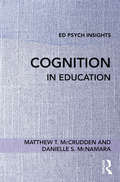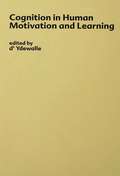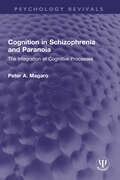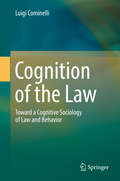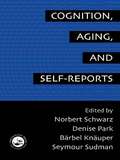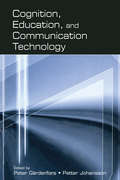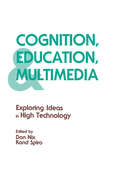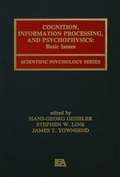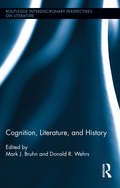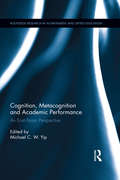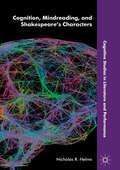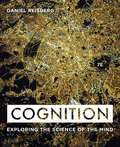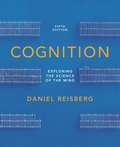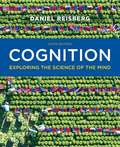- Table View
- List View
Cognition and Perception: How Do Psychology and Neural Science Inform Philosophy? (The\mit Press Ser.)
by Athanassios RaftopoulosAn argument that there are perceptual mechanisms that retrieve information in cognitively and conceptually unmediated ways and that this sheds light on various philosophical issues.In Cognition and Perception, Athanassios Raftopoulos discusses the cognitive penetrability of perception and claims that there is a part of visual processes (which he calls “perception”) that results in representational states with nonconceptual content; that is, a part that retrieves information from visual scenes in conceptually unmediated, “bottom-up,” theory-neutral ways. Raftopoulos applies this insight to problems in philosophy of science, philosophy of mind, and epistemology, and examines how we access the external world through our perception as well as what we can know of that world. To show that there is a theory-neutral part of existence, Raftopoulos turns to cognitive science and argues that there is substantial scientific evidence. He then claims that perception induces representational states with nonconceptual content and examines the nature of the nonconceptual content. The nonconceptual information retrieved, he argues, does not allow the identification or recognition of an object but only its individuation as a discrete persistent object with certain spatiotemporal properties and other features. Object individuation, however, suffices to determine the referents of perceptual demonstratives. Raftopoulos defends his account in the context of current discussions on the issue of the theory-ladenness of perception (namely the Fodor-Churchland debate), and then discusses the repercussions of his thesis for problems in the philosophy of science. Finally, Raftopoulos claims that there is a minimal form of realism that is defensible. This minimal realism holds that objects, their spatiotemporal properties, and such features as shape, orientation, and motion are real, mind-independent properties in the world.
Cognition and Social Behavior (Carnegie Mellon Symposia on Cognition Series)
by John W. Payne John S. CarrollFirst published in 1976. This volume presents the collected papers of the Eleventh Annual Symposium on Cognition, held at Carnegie-Mellon University in April, 1975. These papers are unique in the history of these symposia for their orientation toward the study of social behavior. This symposium brings together the two fields of social psychology and cognitive psychology in response to a growing desire among many social psychologists to seek out or develop a more systematic body of theory, and a corresponding desire among many cognitive psychologists to study the everyday affairs of people outside the laboratory.
Cognition and the Brain
by Andrew Brook Kathleen AkinsAn up-to-date and comprehensive overview of the philosophy and neuroscience movement.
Cognition and the Symbolic Processes (Psychology Revivals)
by David S. Palermo Walter B. WeimerOriginally published in 1974 and taking the revolution in psycholinguistics and cognitive psychology as a point of departure, this book summarizes the lessons learned from past attempts to construct a psychology of the higher mental processes. Even more importantly, it crystallizes specific directives and research proposals that show where cognitive psychology ought to go in the future. The relationship of learning theory, linguistics, and perception to the broad field of cognition and the nature of mind and knowledge are examined in detail. Today it can be read in its historical context.
Cognition and the Symbolic Processes: Applied and Ecological Perspectives
by Robert R. Hoffman David S. PalermoThis volume is a festschrift dedicated to James J. Jenkins, a pioneer in many areas of experimental psychology. It has three major goals: to provide a forum for debate on current theoretical issues in cognitive psychology, to capture the "state of the art" in reviews of research methods and results, and to generate ideas for new research directions and methodologies. Contributors -- including Jenkins' former students and present colleagues -- ponder fundamental questions such as: * How do people learn to read? * What happens during the processes of speech perception? * How do people acquire problem solving skills? * How do cognitive and motor skills develop and integrate with one another? Many chapters focus specifically on ecological and applied cognitive psychology. Specific topics covered include visual and speech perception, language, memory, motivation, child development, problem solving, and pedagogy.
Cognition and the Symbolic Processes: Volume 2 (Psychology Revivals)
by David S. Palermo Walter B. WeimerOriginally published in 1982, this book (following the previous volume published in 1974) continued to look at current issues in theoretical and cognitive psychology and looked for new directions for fruitful theory and research. The major concern for all the contributors was with the construction of a psychology of the higher mental processes through the evaluation of and improvement upon past efforts, as well as the exploration of related areas or disciplines for relevant new ideas. The contributors to this volume shared in common the rejection of not only behavioristic and associationistic approaches but also the sensory information-processing model that earlier dominated and (by weight of numbers of adherents and publications) still dominated cognitive psychology at the time. Today it can be read and enjoyed in its historical context.
Cognition as Intuitive Statistics (Psychology Revivals)
by Gerd Gigerenzer David J. MurrayOriginally published in 1987, this title is about theory construction in psychology. Where theories come from, as opposed to how they become established, was almost a no-man’s land in the history and philosophy of science at the time. The authors argue that in the science of mind, theories are particularly likely to come from tools, and they are especially concerned with the emergence of the metaphor of the mind as an intuitive statistician. In the first chapter, the authors discuss the rise of the inference revolution, which institutionalized those statistical tools that later became theories of cognitive processes. In each of the four following chapters they treat one major topic of cognitive psychology and show to what degree statistical concepts transformed their understanding of those topics.
Cognition in 3E: Multidisciplinary Perspectives (Studies in Applied Philosophy, Epistemology and Rational Ethics #56)
by Tommaso BertolottiThis book originated at a workshop by the same name held in May 2018 at the University of Pavia. The aim was to encourage a cross-disciplinary discussion on the limits of cognition. When venturing into cognitive science, notwithstanding the approach, one of the first riddles to be solved is the definition of cognition. Any definition immediately sparks the ascription debate: who/what cognizes? Definitions may appear either too loose, or too demanding. Are bacteria included? What about plants? Is it a human prerogative? We engage in the quest for artificial intelligence, but is artificial cognition already the case? And if it was a human prerogative, are we doing it all the time? Is cognition a process, or the sum of countless sub processes? Is it in the brain, or also in the body? Or does it go beyond the body? Where does it start? Where does it end? We tried answering these questions each from our own perspectives, as philosophers, ethnographers, psychologists and rhetoricians, handing each other our peculiar insight.
Cognition in A Digital World
by Herre Van OostendorpMassive changes are taking place in society surrounding the delivery of information to individuals and the way they process this information. At work, at home, and in schools, the Internet and the World Wide Web are altering the individual's work, his leisure time, her workplace, and their educational environments. All of these changes and their consequences have traditionally been investigated largely within the domain of sociology, semiotics, mass communication, and computer science. The perspective from cognitive psychology has been lacking. The purpose of this volume is to fill this gap. The focus of the book is the cognitive effects of the modern digital environment. In addition, questions are raised about what cognitive conditions must exist for adequately processing information in multimedia environments. Internet use routinely involves the exchange of factual information but also a large amount of information with an interpersonal character is communicated. A socio-psychological perspective is needed to understand both kinds of communication, also to be able to design appropriate support tools. In Cognition in a Digital World, the emphasis is on the psychological analysis of interactive and continuing communication and discourse, rather than on the technical aspects of the individual's interaction at the interface. The three main themes of this volume are: *conditions and consequences of multimedia information processing by the individual; *socio-psychological characteristics of information transfer over the World Wide Web; and *analysis of computer-mediated collaborative communication. Cognition in a Digital World will be of interest to a wide audience of researchers and students in the fields of cognitive science, education, communication sciences, computer science and the arts (discourse analysis).
Cognition in Close Relationships
by Frank D. Fincham Garth J. O. FletcherThe past decade has witnessed an explosion of interest and research on close relationships and social cognition. In both areas, numerous handbooks, textbooks, and journal articles have been published. However, it is the editors' impression that although cognitive theories and concepts have filtered through to research dealing with close relationships, much of this research reflects a relatively untutored understanding of the theoretical and empirical work in social cognition. Conversely, the research literature that provides a more sophisticated perspective on the role of cognition in close relationships typically reveals a relatively limited knowledge of the literature on close relationships. As researchers who have worked in both social cognitive processes and close relationships, Fletcher and Fincham are convinced that each field has much to offer the other. In fact, their book is based on two important postulates: first, that a social cognitive framework offers a valuable resource for developing our understanding of close relationships; and, second, that studying cognition within close relationships has the potential to inform our understanding of basic social cognitive processes.
Cognition in Education (Ed Psych Insights)
by Matthew T. McCrudden Danielle S. McNamaraThere is commonly-held belief that some people learn better than others because they are born that way. However, research indicates that many people who learn better are simply more strategic: they use effective strategies and techniques to improve their learning. Further, these strategies and techniques can be taught to students. Thus, understanding how we learn enriches our lives and the lives of others. Written by leading experts on learning, this book situates this topic within the broader context of educational psychology research and brings it to a wider audience. With chapters on how the mind works, evidence-based recommendations about how to enhance learning from both the perspective of students and teachers, and clear explanations of key learning concepts and ideas, this short volume is designed for any education course that includes learning in the curriculum. It is indispensable for pre- and in-service teachers and student researchers alike.
Cognition in Human Motivation and Learning
by J. R. NuttinPublished in the year 1982 Cognition in Human Motivation and Learning is a valuable contribution to the field of Cognitive Psychology.
Cognition in Practice
by Jean LaveMost previous research on human cognition has focused on problem-solving, and has confined its investigations to the laboratory. As a result, it has been difficult to account for complex mental processes and their place in culture and history. In this startling - indeed, disco in forting - study, Jean Lave moves the analysis of one particular form of cognitive activity, - arithmetic problem-solving - out of the laboratory into the domain of everyday life. In so doing, she shows how mathematics in the â real world', like all thinking, is shaped by the dynamic encounter between the culturally endowed mind and its total context, a subtle interaction that shapes 1) Both tile human subject and the world within which it acts. The study is focused on mundane daily, activities, such as grocery shopping for â best buys' in the supermarket, dieting, and so on. Innovative in its method, fascinating in its findings, the research is above all significant in its theoretical contributions. Have offers a cogent critique of conventional cognitive theory, turning for an alternative to recent social theory, and weaving a compelling synthesis from elements of culture theory, theories of practice, and Marxist discourse. The result is a new way of understanding human thought processes, a vision of cognition as the dialectic between persons-acting, and the settings in which their activity is constituted. The book will appeal to anthropologists, for its novel theory of the relation of cognition to culture and context; to cognitive scientists and educational theorists; and to the â plain folks' who form its subject, and who will recognize themselves in it, a rare accomplishment in the modern social sciences.
Cognition in Schizophrenia and Paranoia: The Integration of Cognitive Processes (Psychology Revivals)
by Peter A. MagaroOriginally published in 1980, Cognition in Schizophrenia and Paranoia presents a theoretical framework that relates three fields of psychology: the experimental research in psychopathology, the developmental literature on intellectual growth, and the literature on hemispheric specialization. The specifications of the separate processes and their integration provides the means to reanalyze our empirical operations and theoretical terms in order to provide a more complete level of understanding, or at least alert us to additional possibilities in research strategies. Today it can be read in its historical context.
Cognition of the Law: Toward a Cognitive Sociology of Law and Behavior
by Luigi CominelliThis book’s basic hypothesis – which it proposes to test with a cognitive-sociological approach – is that legal behavior, like every form of human behavior, is directed and framed by biosocial constraints that are neither entirely genetic nor exclusively cultural. As such, from a sociological perspective the law can be seen as a super-meme, that is, as a biosocial constraint that develops only in complex societies. This super-meme theory, by highlighting a fundamental distinction between defensive and assertive biases, might explain the false contradiction between law as a static and historical phenomenon, and law as a dynamic and promotional element. Socio-legal scholars today have to face the challenge of pursuing a truly interdisciplinary approach, connecting all the fields that can contribute to building a modern theory of normative behavior and social action. Understanding and framing concepts such as rationality, emotion, or justice can help to overcome the significant divide between micro and macro sociological knowledge. Social scientists who are interested in the law must be able to master the epistemological discourses of different disciplines, and to produce fruitful syntheses and bridge-operations so as to understand the legal phenomenon from each different point of view. The book adopts four perspectives: sociological, psychological, biological-evolutionary and cognitive. All of them have the potential to be mutually integrated, and constitute that general social science that provides common ground for exchange. The goal is to arrive at a broad and integrated view of the socio-legal phenomenon, paving the way for a comprehensive theory of norm-oriented and norm-perceived actions.
Cognition, Aging and Self-Reports
by Norbert Schwarz Seymour Sudman Denise C. Park Bärbel KnäuperFirst Published in 1998. Routledge is an imprint of Taylor & Francis, an informa company.
Cognition, Education, and Communication Technology
by Peter Gärdenfors Petter JohanssonCognition, Education, and Communication Technology presents some of the recent theoretical developments in the cognitive and educational sciences and implications for the use of information and communication technology (ICT) in the organization of school and university education. Internationally renowned researchers present theoretical perspectives with proposals for and evaluations of educational practices. Each chapter discusses different aspects of the use of ICT in education, including:*the role of perceptual processes in learning;*external cognition as support for interactive learning;*the role of meta-cognition;*simulation learning environments as cognitive tools;*the role of science controversy for knowledge integration;*the use of ICT in the development of educators; and*the role of narratives in education.ICT has great potential for revolutionizing education. Large investments of resources are being made, often without a strong understanding of how ICT will or should be implemented. The expectation is that students will show immediate improvements in terms of their motivation to learn and their learning achievements, but reality is different. Progress of ICT in education requires more than just computers in the classroom. It demands an understanding of the complex processes contributing to human learning and how they interact with new technologies. This text provides theoretical perspectives on the learning processes that can be used as a foundation for constructing pedagogically valuable tools based on ICT.The combination of results--from cognitive science and pedagogy, with more practically oriented suggestions for how ICT can be used in various forms of education--makes this book suitable for researchers and students in the cognitive and educational sciences, as well as for practitioners and planners of education.
Cognition, Education, and Multimedia: Exploring Ideas in High Technology
by Rand J. Spiro Don NixComputers have become a topic of concern, debate, argument, dogmatism, and inquiry among a variety of people who are interested in the fate and effectiveness of the educational system. This book presents working hypotheses of ways in which computers may fit into and/or transform classroom education. Through the exploration of learning and cognitive theory as it infuses technological developments, this volume promises to illuminate a number of important issues, including experiential learning and nontraditional computer-based instruction.
Cognition, Information Processing, and Psychophysics: Basic Issues (Scientific Psychology Series)
by James T. Townsend Hans-Georg Geissler Stephen W. LinkThe plan for this volume emerged during the international Leipzig conference commemorating the centenary of the death of Gustav Fechner. The contributors suggested that while many features of modern psychological theory were anticipated by Fechner, many new theoretical approaches owe much more to him than often is realized. As such, they decided to honor Fechner by evaluating his own contribution to the founding of psychology and psychoanalysis, by deepening the foundations of psychological theories of consciousness, perception, and choice, and by using the analysis of time to create a new appreciation of constraints that bind mental processes together. Thus, this volume spans an extraordinary range of psychological topics, from hermeneutics to the time-quantum basis for mental processes, in a way that would both amaze and delight Fechner. Moreover, the international reach of his pioneering ideas can be seen from the current locations of the contributors. The span from Japan to the United States to Holland to Germany and to Israel provides a global measure of Fechner's scientific legacy.
Cognition, Literature, and History (Routledge Interdisciplinary Perspectives on Literature)
by Donald R. Wehrs Mark J. BruhnCognition, Literature, and History models the ways in which cognitive and literary studies may collaborate and thereby mutually advance. It shows how understanding of underlying structures of mind can productively inform literary analysis and historical inquiry, and how formal and historical analysis of distinctive literary works can reciprocally enrich our understanding of those underlying structures. Applying the cognitive neuroscience of categorization, emotion, figurative thinking, narrativity, self-awareness, theory of mind, and wayfinding to the study of literary works and genres from diverse historical periods and cultures, the authors argue that literary experience proceeds from, qualitatively heightens, and selectively informs and even reforms our evolved and embodied capacities for thought and feeling. This volume investigates and locates the complex intersections of cognition, literature, and history in order to advance interdisciplinary discussion and research in poetics, literary history, and cognitive science.
Cognition, Metacognition and Academic Performance: An East Asian Perspective (Routledge Research in Achievement and Gifted Education)
by Michael C. W. YipLearning strategies and academic performance have been extensively investigated but relatively few studies were conducted in East Asia. This volume presents a reflection on the current status of metacognition and academic performance in the East Asian region. It serves to provide a more complete picture of the global study of how students‘ learning and studying strategies affect their acdemic performance. This book will be of interest to researchers and educators in the area of education, education psychology, cross-cultural studies, education policy, curriculum and instruction and regional studies.
Cognition, Mindreading, and Shakespeare’s Characters (Cognitive Studies In Literature And Performance Ser.)
by Nicholas R. HelmsCognition, Mindreading, and Shakespeare's Characters brings cognitive science to Shakespeare, applying contemporary theories of mindreading to Shakespeare’s construction of character. Building on the work of the philosopher Alvin Goldman and cognitive literary critics such as Bruce McConachie and Lisa Zunshine, Nicholas Helms uses the language of mindreading to analyze inference and imagination throughout Shakespeare’s plays, dwelling at length on misread minds in King Lear, Much Ado About Nothing, Othello, and Romeo and Juliet. Shakespeare manipulates the mechanics of misreading to cultivate an early modern audience of adept mindreaders, an audience that continues to contemplate the moral ramifications of Shakespeare’s characters even after leaving the playhouse. Using this cognitive literary approach, Helms reveals how misreading fuels Shakespeare’s enduring popular appeal and investigates the ways in which Shakespeare’s characters can both corroborate and challenge contemporary cognitive theories of the human mind.
Cognition: Exploring The Science Of The Mind
by Daniel ReisbergOne of the most successful texts ever published on its subject, the new Seventh Edition focuses on the insights and ideas that drive the field and supports student learning. Three exciting features—a new pedagogical program based on the “testing effect,” a comprehensive, author-created instructor’s guide, and ZAPS Cognition Labs—deliver a dynamic, interactive introduction to cognitive psychology today.
Cognition: Exploring the Science of the Mind (Fifth Edition)
by Daniel ReisbergCognition uses the best of current research to help students think like psychologists and understand how cognitive psychology is relevant to their lives. The Fifth Edition offers a streamlined presentation, introduces an attractive new full-color design and an expanded art program, and has been thoughtfully updated with the best of current research.
Cognition: Exploring the Science of the Mind, 6th Edition
by Daniel ReisbergCognition uses the best of current research to help students think like psychologists and understand how cognitive psychology is relevant to their lives. The Sixth Edition offers revised and revitalized ZAPS 2.0 Cognition Labs, enhanced neuroscience illustrations, and a new ebook, providing a highly interactive way for students to learn cognitive psychology.
